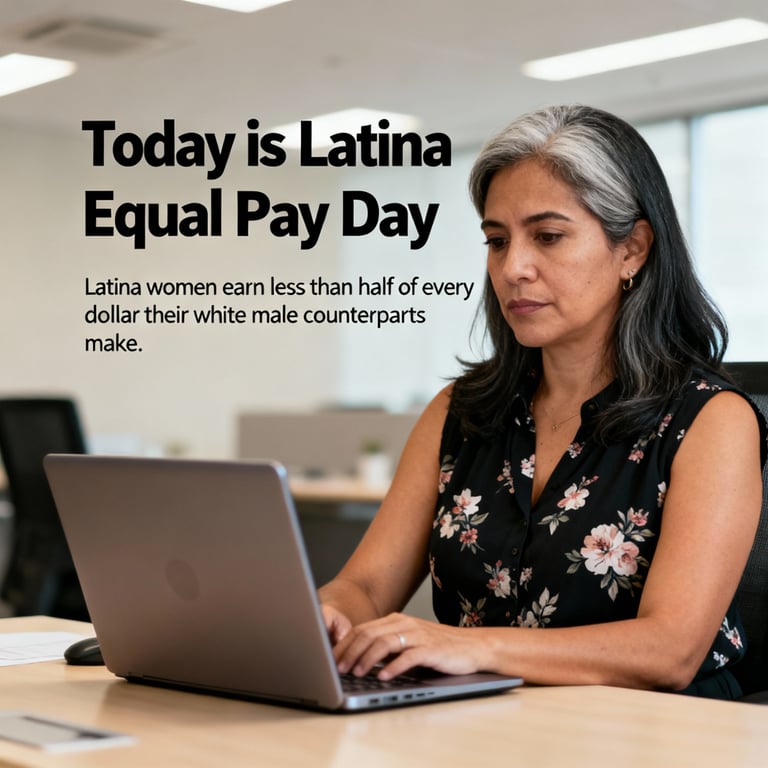Thriving isn't the goal, it's the baseline
Latina Equal Pay Day: The Million-Dollar Pay Gap You Didn’t See Coming (But She’s Been Living It)
Andrea Baird
10/8/20253 min read


Today marks Latina Equal Pay Day, the day in the year when Latina women finally catch up to what white, non-Hispanic men were paid in the previous calendar year. In other words, it takes an extra 10 months of work for Latina women to earn what their white male counterparts earn by December 31st. If that sounds infuriatingly unfair, it is. But buckle up, because the numbers don’t lie, and the reality is even more jarring.
The Pay Gap By the Numbers
Latina women working full-time, year-round in the U.S. are paid just 52 cents for every dollar paid to white, non-Hispanic men. When part-time and gig work is factored in—roles that many Latina women hold due to systemic barriers—the gap widens to just 46 cents on the dollar.
Compare this with:
Asian American women: ~93 cents on the dollar
White women: ~83 cents
Black women: ~66 cents
Native American women: ~55 cents
Latina women rank at the bottom of the pay scale, despite being at the forefront of essential industries like healthcare, education, food service, and caregiving. It's not a coincidence. It’s a structural issue.
Over a Lifetime: A Million-Dollar Loss
That 52-cent gap doesn’t just mean smaller paychecks since it compounds over time. Over the course of a 40-year career, the average Latina woman stands to lose more than $1.2 million in wages compared to white men doing similar work.
That’s not a missed vacation or a slightly smaller nest egg. That’s homeownership delayed, healthcare unaffordable, retirement uncertain, and generational wealth erased before it’s even established. That's the price of inequality, paid daily, in full, by Latina workers.
Working More to Make Less
Because of this gap, many Latinas are forced to work multiple jobs to make ends meet, often juggling caregiving responsibilities and facing unsafe or exploitative working conditions. The myth of the "lazy worker" dies a quick death when faced with a Latina mother working two to three jobs while raising children and supporting extended family. She’s not leaning in—she’s holding the entire damn structure up.
The Ripple Effect: Community and Economic Impact
This wage theft isn’t just a personal loss—it’s an economic drain. When Latina women are underpaid:
Families suffer. Latinas are often primary breadwinners. Less income means fewer resources for housing, education, and healthcare.
Communities stagnate. Local economies miss out on billions in consumer spending and tax revenue.
The nation loses. According to the National Women’s Law Center, closing the wage gap could add over $1 trillion to the U.S. economy.
In short, when Latinas are underpaid, everyone pays the price.
🌀 Nepantla: The In-Between Space That Becomes Power
Latina women often exist in a cultural and professional in-between—a concept known in Nahuatl as Nepantla. It refers to the liminal space between worlds, identities, and truths. In the workplace, this might manifest as navigating boardrooms dominated by whiteness while upholding ancestral wisdom, bilingual communication, and community-centered values.
While Nepantla can feel disorienting, it’s also a superpower. Latina women draw from multiple cultural reservoirs to adapt, mediate, build bridges, and lead with empathy and grit. The very thing that makes them "othered" in corporate culture is also what makes them extraordinarily resilient, innovative, and indispensable.
So, What Now?
Change isn’t just about raising awareness, it’s about rewriting the rules. That includes
Transparent pay policies
Promotion and mentorship opportunities for Latinas
Investments in childcare, education, and health access
And yes, raising the minimum wage already.
If the American Dream (which seems so far away for the time being) is really for everyone, it’s time to stop asking Latinas to pay double for admission. Or, to quote every abuela ever: Ya basta (or enough is enough).
Honor Latina Equal Pay Day by recognizing the value of Latina labor and not just in sentiment, but in salary. Because if you’re benefiting from her work, she deserves to benefit, too.